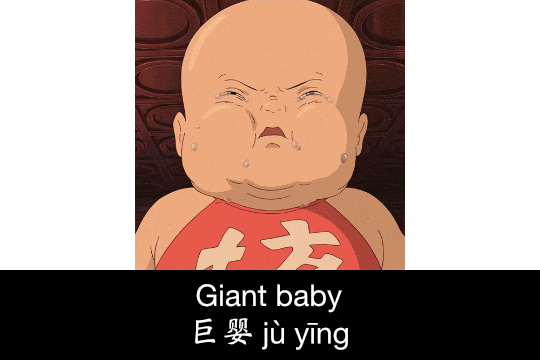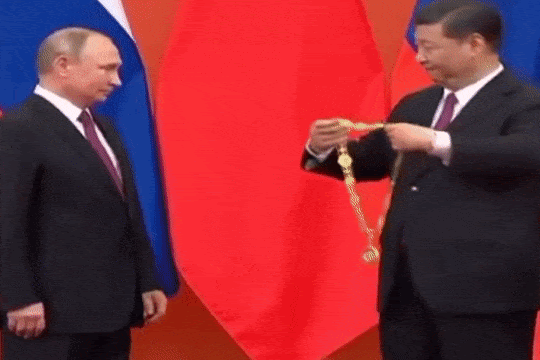Don’t be a giant baby


Announcements for Access members:
-
Join us on Slack for a chat with Joanna Chiu, chair of NuVoices and author of a viral Foreign Policy piece on sexism among journalists abroad, next Tuesday (June 12) at 9:30 a.m. EST. Joanna will be available to talk about women’s rights and China. Bookmark our Slack channel link: supchina.slack.com. Send us your question ahead of time if you can’t attend!
-
If you missed the chat with Fergus Ryan, cyber analyst at the Australian Strategic Policy Institute (ASPI), then you can see an archive of that chat — and all others on the The China Project Access channel — right here.
—Jeremy Goldkorn and team

1. Help me choose our next story
First thing today: We want to commission a story that requires original research about a topic of interest to YOU, our dear Access members. What would you like us to spend some editorial sweat and treasure on? Let me know via jeremy@thechinaproject.com.
2. Don’t be a giant baby and obey the local laws!
After yesterday’s announcement of a massive fine and other penalties from the U.S. Commerce Department, which will allow Chinese telecoms giant ZTE to stay in business, much of the “news” today is commentary. For example:
-
Skepticism and backlash follow US deal with China’s ZTE / CNN
-
What Is ZTE? A Chinese Geopolitical Pawn That Trump Wants to Rescue. / NYT (paywall)
This piece of commentary (in Chinese) published yesterday by Xinhua News Agency is worth a read. Bloomberg glosses it as: “After helping ZTE, China warns firms not to be ‘giant babies.’” The piece argues that Chinese companies need to respect rule of law when doing business abroad, and should not expect help from the government. The article also sets out a rationale for the government to help ZTE: too many jobs at stake. Xinhua essentially says ZTE was too big to fail.
Below are some translated excerpts:
The price paid by ZTE may be heavy and painful. However, objectively speaking, this is the price a multinational must pay if it violates the spirit of a contract. The consequences that [ZTE] had to bear for not taking taking laws and regulations seriously should be noted by all Chinese companies and even all multinationals…
On the day when the United States issued the ban on ZTE on April 16, the Chinese Ministry of Commerce stated: “China has always required Chinese companies to abide by the laws and policies of their host country and conduct operations legally and in compliance with regulations in the course of overseas operations.”
However, the livelihoods of its 80,000 employees and 20,000 families depend on ZTE — it’s the largest listed telecommunications equipment company in China. ZTE’s fate also affects the future of thousands of companies and hundreds of thousands of employees in the upstream and downstream industries. The starting point and end result of the Chinese government’s work is for the people. The mistakes of a company’s decision cannot involve the vast number of innocent employees and families. It is precisely because of this that the Chinese government has invested a lot of resources, going from Beijing to Washington, and then back to Beijing, and conducted many rounds of rigorous negotiations, to finally save ZTE. This also shows that a confident and strong government is the best protector of the people…
International companies must adopt an international style [国际范儿 guójì fàn’er]. They must not be “giant babies” [巨婴 jù yīng] and get the government mixed up in their commercial interests…
…Just because the Chinese government rescued ZTE from death on behalf of the public, does not mean that Chinese companies should look to the government in the future. In the international market, it is the spirit of the contract and the law that governs business, not the administrative intervention of the government. More and more Chinese enterprises have gone abroad in the past few years, but when they go out, the key is to rely on clearly understanding international rules…
A final point made by the Xinhua commentary worth noting is a lesson learned by every observer of the ZTE case in China: The country is still way too dependent on American technologies for its own comfort. Here’s how Xinhua put it:
Chinese companies must further awaken to the necessity and urgency of innovation. They must firmly hold the core technology in their own hands as soon as possible.
3. Chinese Corner: Our new weekly roundup of Chinese writing
One of the most frequent requests I have received since I took over as editor of The China Project is for more links to and explanation or commentary on Chinese writing, including journalism, fiction, and long-form writing of all kinds.
So I’m delighted to present this week our first installment of Chinese Corner, by Jiayun Feng. It’s a weekly roundup of interesting or popular Chinese writing on the internet, with each article summarized together with links to the original Chinese and relevant background reading.
Today’s installment includes commentary on reality TV star and “gay icon” Wang Ju 王菊, a list of new slang — such as blind adulterer (盲式出轨 mángshì chūguǐ), a person who has an affair with someone who is inferior to their spouse — and the toxic subculture of “pickup artists” (PUA).
I’d be particularly interested in your feedback on this new column: if Access members really like it, we’ll put a lot of work into it and make it members-only. Just reply to this email to let me know what you think.
—–
Our whole team really appreciates your support as Access members. Please chat with us on our Slack channel or contact me anytime at jeremy@thechinaproject.com.
—Jeremy Goldkorn, Editor-in-Chief
 Here are the stories that caught our eye this week:
Here are the stories that caught our eye this week:
-
Former Defense Intelligence Agency analyst Ron Rockwell Hansen was arrested on 15 charges on June 2, including “attempting to gather or deliver national defense information to aid a foreign government” and “acting as an unregistered foreign agent for China, bulk cash smuggling, structuring monetary transactions and smuggling goods from the United States.” Hansen is the fourth American to be arrested on espionage charges related to China in the past year.
-
Chinese telecom giant ZTE has agreed to a deal brokered by the U.S. Department of Commerce that will allow it to stay in business. The deal requires the company to pay over $1 billion in fines as well as overhaul its leadership. Many Americans are displeased with the Trump administration trying to bring a company caught violating Iran sanctions and deemed a threat to national security back into business. As Gizmodo eloquently put it, however, Trump is saving China’s ZTE for some reason and Congress can’t do jack shit about it.
-
In other U.S.-China commerce news, Facebook once again made headlines after the public learned of the company’s data-sharing contract with Huawei. While Huawei denies having collected Facebook user data, its troubled status with U.S. Intelligence has led to scrutiny.
-
A mystery illness, similar to the one that affected employees at the American embassy in Cuba, has resulted in multiple employee evacuations from the American consulate in Guangzhou, further stressing the U.S.-China relationship. China has pledged to investigate the illness.
-
It’s the end of gaokao week, meaning that millions of Chinese high-schoolers are finishing the exam that determines their university prospects. While the stress is nothing new, the finger vein scanners and particular emphasis on Xi Jinping’s propaganda slogans are. For a brief history of the exam, click through to The China Project.

-
China says Brazil’s been dumping chickens
China’s importers of Brazilian chickens must pay deposits of up to 40pc under new anti-dumping measures / SCMP
“China will impose temporary anti-dumping measures on Brazilian broiler chickens from June 9, the commerce ministry said on Friday, after finding in a preliminary ruling that its domestic industry has been substantially damaged by the imports.” -
Kim Jong-un impersonator detained
Howard X, Hong Kong-born Kim Jong-un impersonator, detained and questioned on arrival in Singapore / SCMP
The Hong Kong-based impersonator was detained and questioned for two hours upon arriving at the city-state’s airport. “They [searched] my bags and then told me that this is a very sensitive time to be in Singapore and that I should stay away from the Sentosa Island as well as the Shangri-La hotel in town.” -
Alibaba raises $14 billion for Ant
Ant Financial raises $14 billion Series C as IPO looms / TechNode
“Alibaba’s financial affiliate Ant Financial announced that it has entered into definitive agreements with investors for its Series C equity financing totaling approximately $14 billion, making a new world record for private fundraising.” -
Nuclear power
Russia joins China’s race for next-generation nuclear reactors / Bloomberg (paywall)
“China has agreed to pursue building next-generation nuclear reactors designed by Russia’s Rosatom Corp., the latest player seeking a boost for its new technology from China’s embrace of atomic power.” -
The consular sonic affair
U.S. expands China health alert after acoustic incident / CNN
“A health alert was first issued for Guangzhou on May 23 after a U.S. employee stationed in the southern Chinese city was diagnosed with a mild brain injury after complaining of unexplained sonic phenomena. The latest alert is countrywide.” -
Suppression of activists
Tibetan advocate’s prison term in China is condemned / NYT (paywall)
“United Nations human rights experts have formally condemned the punishment of a Tibetan education advocate who was sentenced to five years in prison after giving interviews to The New York Times.” Their statement: UN human rights experts condemn 5-year jail term for Tibetan activist. -
Putin in China, wins friendship medal
Xi touts Putin ties as US tensions bring them closer / AFP via Yahoo
“President Xi Jinping gave China’s first friendship medal to Russian counterpart Vladimir Putin on Friday as the neighbouring giants touted their close ties amid diplomatic and economic challenges from the US.” -
Shanghai Cooperation Organization (SCO)
China calls on region to work together to fight terror threats ahead of security summit / SCMP
The SCO meets June 9 and 10 in Qingdao (see list of member states). Chinese state media said the agenda would focus on “measures to fight the ‘three evil forces’ of terrorism, extremism and separatism, drug trafficking, and cybercrime,” as well as “promoting the construction of the Belt and Road.” -
Chinese antiquities abroad
How a Chinese manuscript written 2300 years ago ended up in Washington
“The findings have put new pressure on the manuscript’s current owner, the Arthur M. Sackler Foundation, to return it to China after decades of on-again, off-again efforts to sell it to Chinese institutions. According to people briefed on the discussions, the foundation is now in renewed talks with Beijing and indicated that it was willing to settle for a ‘finder’s fee.’” -
Chinese soccer tourists
100,000 Chinese tourists are descending on Russia to watch the FIFA World Cup / SCMP
A combination of geopolitical factors and soccer-mania is drawer record numbers of Chinese fans to this year’s FIFA tournament. -
Pompeo to China
U.S. Secretary of State Mike Pompeo to visit China and South Korea after Donald Trump’s summit with Kim Jong-un / SCMP
“U.S. Secretary of State Mike Pompeo has said he will visit Beijing and Seoul next week to brief senior officials from China, South Korea and Japan on the outcome of the first-ever summit between the United States and North Korea in Singapore.” -
Hotpot hygiene disaster
Chinese diners find eight cockroaches in their hotpot / SCMP
According to the customers, “it was only when one of them bit into one of the six-legged creepy-crawlies that they realized exactly what they were dining on.” For more hotpot drama, check out this video of a crayfish detaching its arm to escape a boiling hotpot.” -
Urban housing for migrant workers
The growing pains of China’s ‘blue-collar’ apartments / Sixth Tone
Well-intentioned ventures often have unanticipated failures, and affordable housing in first-tier Chinese cities is no exception. -
Xiaomi pioneers domestic financing
Xiaomi becomes China’s first company to file for a CDR / TechNode
“Chinese smartphone maker Xiaomi filed an application to issue a CDR (Chinese Depositary Receipt) today, June 8th, with the China Securities Regulatory Commission, local media is reporting. If permitted, Xiaomi could be the first company to issue a CDR.” -
On-demand bicycles hit a bump
Ofo’s overseas operations show signs of cash crunch / TechNode
“The troubled bike hire giant has launched a warehouse sale of its bikes to downsize its operation in Singapore,” among other measures, to account for shrinking funds. -
Real money for blockchain social network
China’s first blockchain-based social network ONO raises $16 million Series A / TechNode
“ONO, China’s first blockchain-based decentralized social network, has raised $16 million in Series A financing from investors including Korea Investment Partners (KIP), Purple Cow Fund, INBlockchain, China Growth Capital, Green Pine Capital Partners, and Grand Shores.”
VIDEO OF THE DAY
Viral on Weibo: Xi Jinping honors Vladimir Putin with China’s first-ever Friendship Medal
It was the first time that China has awarded the medal since it was established in 2015.
ON SUPCHINA
Now on Netflix: A love song to China’s Belt and Road Initiative
A new movie conveniently timed for the China-Pakistan Economic Corridor explores the story of a Chinese backpacker and a Pakistani doctor who meet on a group tour and, despite cultural barriers, fall in love.
The China Project News Quiz, June 1-7: Mystery illnesses, espionage, trade war
What’s up in China? Test your knowledge of the news with this fun 8-question quiz, and then tweet your score @supchinanews! Check back every Friday for a new challenge.
996 Podcast: Jenny Lee of GGV Capital on Being a VC in China
Jenny Lee is a former jet engineer turned venture capitalist, and now managing partner at GGV Capital based in Shanghai. Hans Tung and Zara Zhang talk with her about her path in the VC world, and how deals are done in China.
Sinica Podcast: China’s security picture, from North Korea to the South China Sea
In this week’s episode of Sinica, Kaiser chats with Bonnie Glaser in a crossover show that will appear both on Sinica and on the ChinaPower Podcast from CSIS, the Center for Strategic and International Studies. Bonnie is a well-known specialist on China’s security issues, and this week, we tour several locations where the Chinese military has evolving plans: the Korean Peninsula, Japan, the South China Sea, and Taiwan.
-
Subscribe to the Sinica Podcast via Apple Podcasts, Overcast, or Stitcher, or plug the RSS feed into your favorite podcast app.
-
The China Project Access members get a special early access feed for Sinica. Plug this URL directly into your podcast player: sinicaaccess.libsyn.com/rss
An Africa storytelling night in Beijing
“In African culture, storytelling played a really important role, and it continues to do so,” says Zahra Baitie, lead organizer of Africa Week in Beijing, a program of events promoting Chinese understanding of African culture. Night of African Storytelling, on May 22, was one of the highlights.
Another fire in Daxing District, Beijing
Around 7 p.m. on June 1, a fire broke out in Xinjian Village 新建村 in Daxing District 大兴区, Beijing, about 300 meters south of Xingzhi Road 行知路, with large billows of black smoke visible from miles away. Daxing, on the outskirts of Beijing, is where a fire in an apartment building on November 18 left at least 19 dead.
China Unsolved: A Scientist Vanishes
In June 1980, renowned scientist Peng Jiamu 彭加木 walked into the Tarim Basin desert looking for potash seams in the dried-up salt lake of Lop Nor — or Luobupo 罗布泊, a former nuclear-testing site and restricted military zone, said to be strewn with ancient burial grounds and mysteries. His body has never been found.
Kuora: The unlikely confluence of events that led to the 1989 Tiananmen Square protests
An almost absurdly unlikely convergence of factors made a protest of Tiananmen’s size possible. They were, many who have studied the protests would concur, all out of proportion to the size of the initial grievance. The tinder was damp, and yet it caught fire. This is not a lesson that the Party leadership has since forgotten.
TechBuzz China: Lu Qi and Baidu: The Breakup That Broke China’s Heart
This week on TechBuzz China by Pandaily, co-hosts Ying-Ying Lu and Rui Ma look at the resignation of Baidu’s COO and tech genius Lu Qi and how the move sparked wave after wave of speculation, commentary, and reaction in the Chinese tech world. Why did his departure strike such a strong chord?
-
Subscribe to TechBuzz China on Apple Podcasts, Overcast, or Stitcher, or click here for the RSS feed.
Fan Bingbing’s exposed contract ignites debate about celebrity salaries
On May 28, TV host Cui Yongyuan 崔永元 posted on his Weibo account an image of Fan Bingbing’s 范冰冰 employment contract, showing the actress would earn $1.6 million (10 million yuan) for her work, plus other demands. “Stop acting, you’re terrible at it,” Cui wrote. Last year, People’s Daily published a commentary that criticized China’s stars for receiving exorbitant salaries despite their lack of acting skills and professionalism.
The Caixin-Sinica Business Brief, episode 50
This week on the Caixin-Sinica Business Brief: A new report that reveals the cost of living in Shanghai and Beijing, scandals surrounding LeEco’s founder, Jia Yueting 贾跃亭, Google’s new app Files Go, Doug Young on the latest in the Chinese auto and dairy sectors, and more.
-
Subscribe to the Business Brief on Apple Podcasts, Overcast, or Stitcher.
From propaganda to pollution to smartphones: A history of gaokao essay questions
No other assessment test has been taken by more people than the gaokao (高考 gāokǎo), China’s national college entrance examination. As the gaokao essay prompts often reflect the Chinese government’s attitudes, it would not be a stretch to say that there’s a parallel between the evolution of gaokao essay questions and how the country itself has changed over the past 40 years. Let’s take a look.
Photos: A rainy day vigil at Victoria Park, Hong Kong
Thousands of people streamed onto the soccer fields — still wet from the afternoon’s rain — in Hong Kong’s Victoria Park on Monday evening to commemorate the 29th anniversary of the June 4, 1989, crackdown at Tiananmen Square. C.J. Davis was there, and took the photos that appear in this collection on The China Project.
Viral videos on Weibo:
-
A crayfish won the admiration of the internet after it cut off its own claw to escape a boiling hotpot in China. Then it was taken home by a diner as a pet.
-
A traffic police officer carried an elderly man across the road on June 4 in Mianyang, Sichuan Province.
-
A fearless driver drove a motor cart with a car on top of it in Huzhou, Zhejiang Province, on May 30.
-
Firefighters rescued about 20 dogs and cats from a local pet store in flames in Hefei, Anhui Province, on May 31.
PHOTO OF THE DAY
Getting ready for the international summit
Qingdao, in China’s eastern Shandong Province, is hosting the Shanghai Cooperation Organization summit on June 9 and 10. In the photo above, high-rise buildings on the waterfront of Shinan District are lit up to welcome delegates.
—Jia Guo










